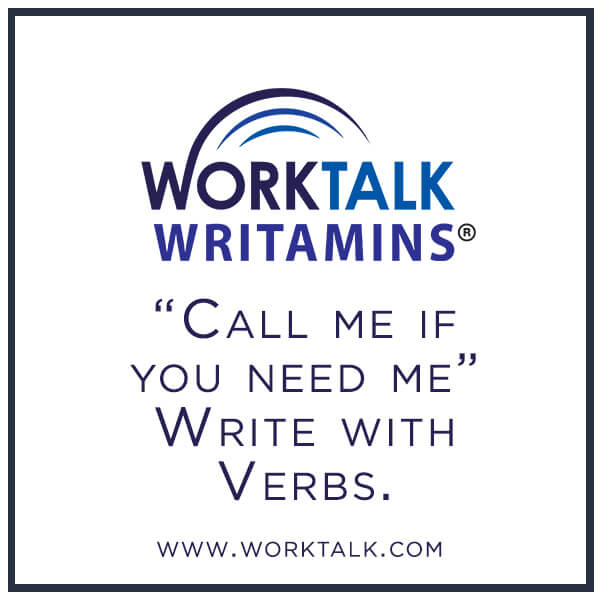
You have two friends. One day, you have a problem. Maybe you break your leg, or you get pneumonia or your basement floods. You need help. One of your friends says to you, “Give me a call if the need arises.” The other one says, “Call me if you need me.”
When you need someone to bail out the basement, which friend are you going to call?
If you’re like the hundreds of people I’ve asked, you probably said that you would call the person who used the verbal forms of call and need by saying, “Call me if you need me.”
Call and Need Do Double Duty
In the first case, the words call and need are used as nouns. We know they are nouns because the articles a and the come before them. Nouns are things. They sit still.
In the second case, call and need are used as verbs. Verbs move. They float, zing, shout, sail, fly, and make stuff happen. They have energy.
We instinctively sense that the person who used the verbs is more authentic, sincere, and to the point than the one who hid out in nouns. That’s why we feel closer to her.
In English, many words can be used as either nouns or as verbs. These words include:
- Work
- Use
- Call
- Request
- Love
- Thought
and many others.
Often you can choose whether to use the word as a noun or a verb. For example, compare:
Careful thought was given to your idea.
We thought carefully about your idea.
As per your request…
As you requested.
Work was done.
We worked.
Notice that the noun form often ties you to the passive voice, which is another form of verbal sludge. The noun phrases seem denser, slower, less focused than the ones that used verbs.
Other Unnecessary Nouns
Nouns may replace verbs in other ways, too. Do you make an analysis, or do you analyze? Do you make a recommendation, or do you recommend? Is it time for action or time to act?
In words that end in –tion, look to the left of the –tion. There you will discover a beautiful, self-respecting verb that you could use instead.
Whenever you fall back on the noun form, you are choosing the static over the active.
Nouns Breed Distance. Verbs Breed Closeness
Nouns are important; they compose the subject of all our sentences. They fill the role of the “person, place, or thing” that we all love and remember from elementary school.
But all nouns are not created equal. If the noun is your subject, knock yourself out. Use it. If your noun is merely cloaking an idea that could be used a verb, consider changing to the verbal form.
Nouns create distance.
If you want to seem a bit standoffish and formal, the noun forms are fine. They get your message across with a whiff of keeping your reader at arm’s length.
However, if your goal is to create immediacy and connection, verbs are your best friends. That’s why the Worktalk writing training always includes the topic Avoid Needless Nouns: Write with Verbs.
So, if you make the choice to give consideration to this advice, use will be made of verb forms over unnecessary nouns.
©2019 Elizabeth Danziger All rights reserved
BOOK YOUR STRATEGY CALL NOW Communication woes drag down productivity and morale. Book your free 30-minute “communications audit” consultation with Elizabeth Danziger. She will listen to your situation and suggest ways to improve communication in your organization right away. Contact her at lizd@worktalk.com or 310.396.8303. You can also book through www.calendly.com/worktalk. ~~~~~~~~~~~~~~~~~~~~~~~~~~~~~~~~~~~~~~~~~~~~~~~~~~~~~~~~~~~~~
Overcome the costs of poor communication today. Contact Elizabeth Danziger at lizd@worktalk.com or Emma Fialkoff at upworktalk@gmail.com to learn how you can achieve better business through better writing.
